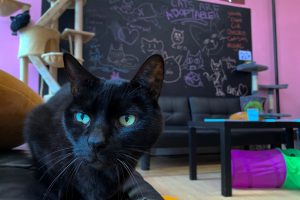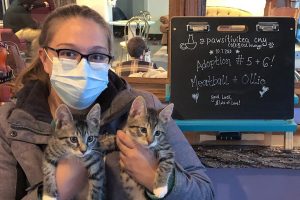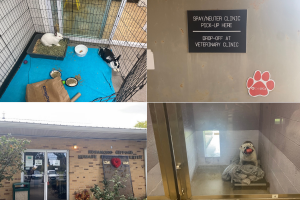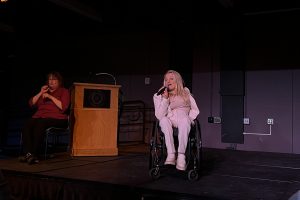Cat rescues, cafes and more help stray cats find a place to call home
Cat rescues and cafes help support the world's stray cats
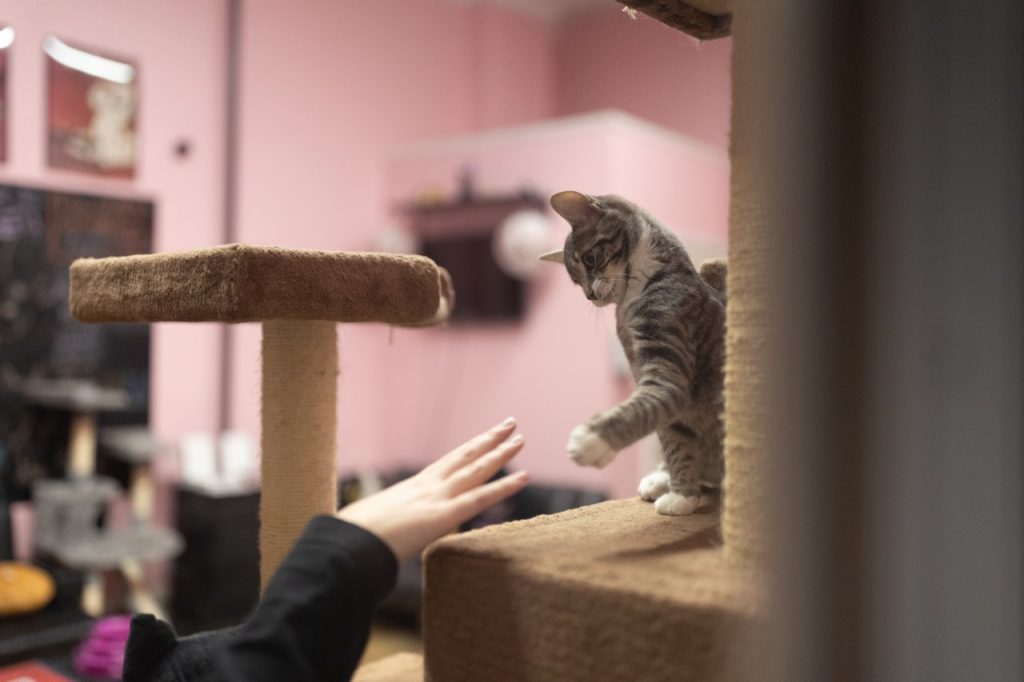
Her voice broke when she tried to recount the story. Quinn White, the development director of Cat Town, a nonprofit cat rescue organization and cafe in Oakwood, California, released a small sniffle and a couple of deep breaths. What White struggles to share is how she came to the organization. And that means talking about the loss of her lifelong pet Rocket.
This loss pushed White into a depression so deep a colleague suggested she volunteer at Cat Town. Working with this organization, these people and these cats, she felt she could honor her cat’s life, and in the meantime, she became hooked on the work the community does. Working tirelessly to find loving families for stressed cats, sick cats, and senior cats gave White the hope of eventually becoming a cat owner again.
Her steps were small at first. She decided to foster first because she did not think she was ready to bring another cat into her life. After her first foster found a home quickly, she continued with the process and brought a second cat, Phoenix, into her home, but just temporarily. But after three failed adoption attempts, White knew Phoenix was meant to stay. And while she did not know if she was ready to open her heart to another cat yet, she quickly realized he was already part of her family.
Through that work, White joined a growing global community focused on the care and support of cats. In the United States alone, there are an estimated 70 million feral cats, and globally that number climbs to 480 million. Since its origination, Cat Town has been able to place nearly 3,000 cats into permanent homes and contribute to lowering the euthanasia rate in Oakland by 25%. These differences in local cat populations appear in every community where cat rescues are at work. Luna Cafe, here in Syracuse, has partnered with the Central New York Cat Coalition from the cafe’s founding, working to get cats adopted every day. Countless organizations are working to not only find homes for these cats but provide them with needed medical procedures that ensure they stay healthy. These organizations employ a variety of strategies, whether they be social media, T.N.R., adoption and more, that all work to support one another. With the persistent help and dedication of these humans, cats around the world are able to make their way into shelters, pet stores and cat cafes to start their journey towards finding a permanent home.
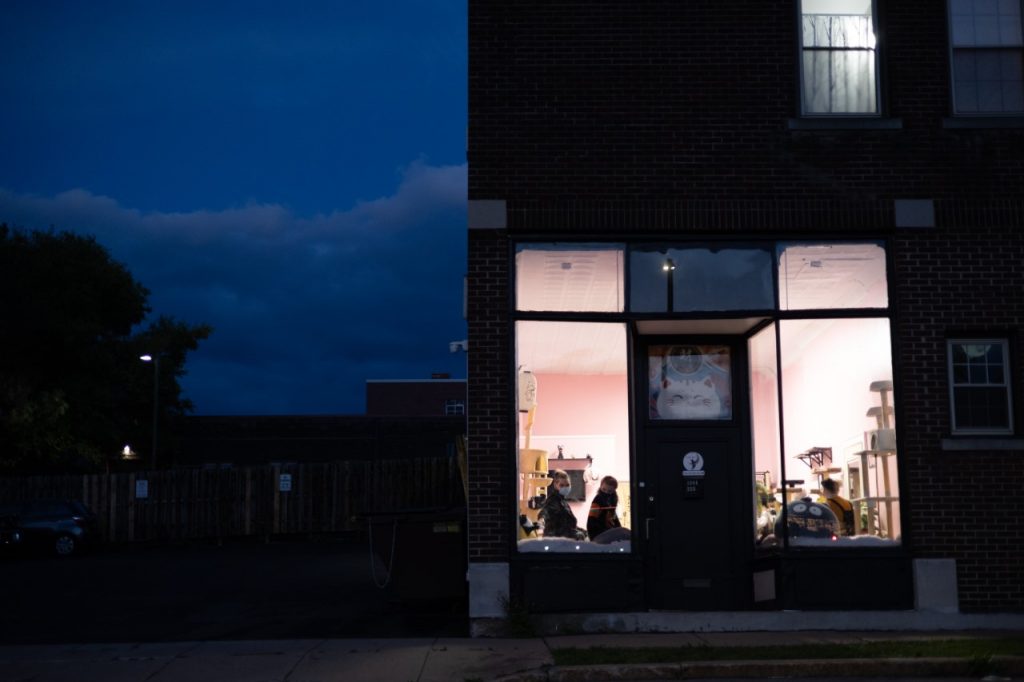
Cat Town opened in 2011 after Ann Dunn, its founder, noticed a serious blind spot in Oakland’s rescue organizations. Working with these organizations for years, she saw them consistently pass over cats that would have a harder time being adopted, instead favoring young, friendly kittens. She knew that there needed to be a change, and soon after this realization Dunn founded Cat Town. Fostering is and always has been central to Cat Town’s mission, but because they work with cats who need extra love and attention, a space that would allow the cats to get out of their cages and feel more comfortable became necessary. With three years under Cat Town’s belt, they opened the United States’ first cat cafe. The cafe became their adoption center, giving the cats a space to grow their confidence and become more visible to potential adopters.
Since the opening of Cat Town, there has been a rise of cat cafes opening across the United States. Josh Davis opened Luna Cafe in Syracuse in 2021. Originally from the midwest, Davis traveled to Japan and lived there for about a year. During his travels in Japan, he fell in love with the people, the culture and most importantly the food, which inspired him to open his own cafe right here in Syracuse. The idea of cat cafes originated in Japan, and Davis, having been a cat owner, decided to honor his cat Luna by naming the cafe after her. Luna Cafe serves traditional Japanese and midwestern foods, allowing Davis to bring influences from his origins and travels into the Syracuse community. The cafe helps local cat organizations like the Central New York Cat Coalition get their cats adopted by loving families.
For Luna Cafe and similar organizations, gaining visibility is one of the most important tools for ensuring success. Social media is the best tool to do this with, and 21st-century cats have lucked out in this area. Cats are one of the internet’s biggest obsessions, from memes like Grumpy Cat to viral Tik Tok trends with their owners. The popularity of social media gave rise to many feline stars. Their owners fill the role of social media assistants, taking photos and adding quirky captions to keep their followers engaged. For example, Luna Cafe, @luna_cafe_syracuse, posts “cat stats” of their adoptable cats and pictures of them at the cafe throughout the week. While not every cat becomes a star, the owners of their accounts work to support the cat community with the platforms they have.
For Rob Hitt, the owner of @bodegacatsofinstagram, and Shannon Jackson, the owner of @smushofficial, social media fame was not the original goal. Both of them started their accounts with the same intention: sharing adorable pictures of cats. However, after being shared on the account @cats_of_instagram, the biggest cat account, with 13 million followers, their following skyrocketed overnight. @smushofficial has almost 700,000 Instagram followers, while @bodegacatsofinstagram has nearly 400,000 on Instagram and 800,000 on Twitter.
Not initially pursuing recognition, they both turned their attention to what their platforms could do for others, and do so in their own ways. Hitt created an online store that sells cat-themed merchandise and donates the profits to organizations in his area that benefit local stray cat communities. Jackson, a creative and a photographer by trade, travels internationally with animal organizations, taking photos and creating content to help expand their social media reach. The time and effort they and countless others give contribute massively to the success of many cat organizations.
Karina Cannales always understood the importance of social media. She’s the founder of the Stray Animal Project, a nonprofit trap-neuter-return organization, which is located in California’s Bay Area but operates in Peruvian communities. Trap-neuter-return organizations, also called TNR orgs, work to stop the breeding cycle for feral cats and promote healthier cat communities. Created in 2019, the Stray Animal Project has been able to fix over 5,000 animals in just two years. They are a donation-based organization that operates exclusively on individual sponsorships and contributions. Many of their supporters find Cannales’ organization through social media, so having preexisting mega accounts share her work offers the organization a platform that directly relates to how big of an impact they can make.
Like many others involved in this conglomerate of cat organizations, Cannales’ journey started right at home. Cannales grew up in Peru and befriended one of the local street cats in her neighborhood. This cat quickly became her best friend and closest confidant. She fed him every day after dinner. She left out a bowl of milk and any leftovers from her family’s meal, like many of the other kids living in her neighborhood. But one day her best friend didn’t come over after dinner.
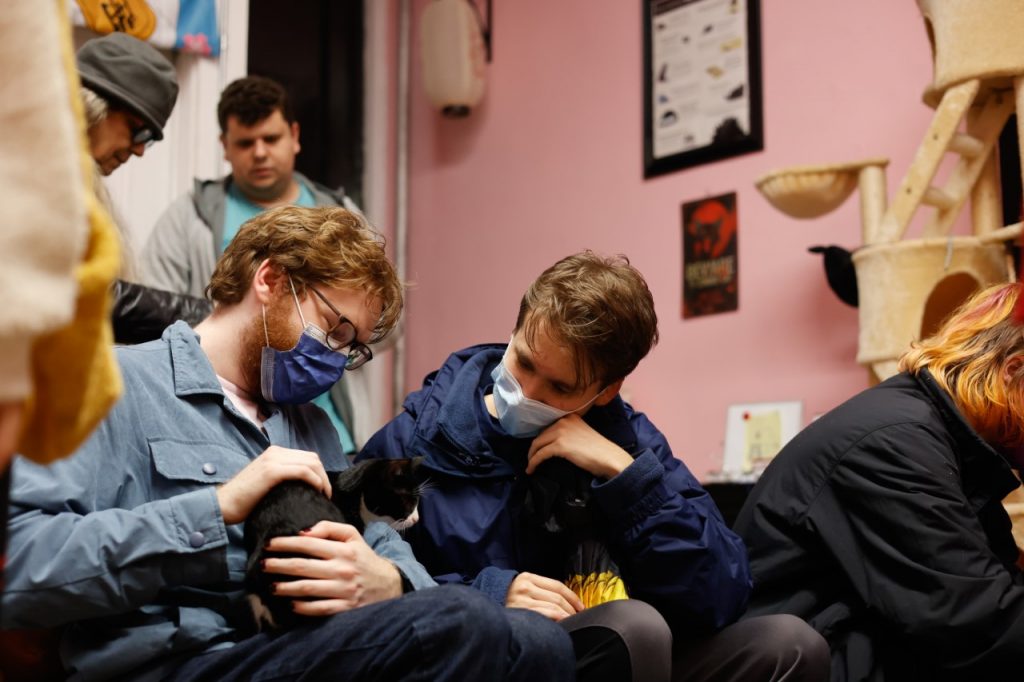
Years later, she was disgusted to learn that “controlling the animal population” meant the government went through the streets and poisoned the stray animals that lived there. The neighborhood pets faced cruelty Cannales did not know existed, only because there were not enough resources to provide them with the medical procedures they needed. From that moment on, it became her dream to help other cats like the one the government took from her.
Many people involved with the cat world grapple with feelings of guilt over not being able to save every animal, and shelters, especially kill shelters, exacerbate this guilt to an unbearable extent. Therefore, a lot of people looking to adopt, or who just want to spend time with animals, refuse to go to a shelter. The perfect solution? Cat cafes. They provide an environment that doesn’t exist elsewhere for those who dream of owning a cat but can’t. Whether that be for financial reasons, allergies, or restricted living situations, the cafe provides a space that meets their needs. Cafes like Cat Town’s, the Brooklyn Cat Cafe, Happy Tabby Cat Cafe and Pawsitivitea CNY (another Syracuse cafe) give people a space where they can take care of their own mental health and give some love to the cats still waiting to find their forever homes.
All of these organizations work tirelessly on their own, and to help uplift one another, in order to make the biggest change in the cat world that they can. The work these individuals, as well as countless others do, from adoptions to social media to providing life-saving procedures, could not be done without the help of one another. It’s a global cat ecosystem where everyone involved works to help one another to accomplish the same goal: finding strays a place that they can call home.

